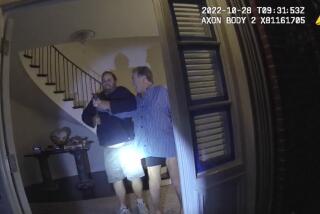The real story behind the faux Jane Harman scandal
In politics, as in comedy, timing is everything, which is why it’s so interesting that the ersatz national security controversy in which Rep. Jane Harman (D-Venice) suddenly finds herself enmeshed has boiled over -- three years after the fact.
According to a story that appeared Sunday in Congressional Quarterly, much of which was subsequently reported by the New York Times, the National Security Agency in 2005 or 2006 intercepted a telephone conversation between Harman and an alleged Israeli agent who was the target of a U.S. government investigation. Neither publication has transcripts, but relying on sources, both reported that the Westside congresswoman -- then the ranking minority member on the House Intelligence Committee -- agreed to intercede with the Bush administration on behalf of two pro-Israeli lobbyists charged with espionage for allegedly receiving classified information and passing it to Israeli officials and American journalists.
In return for this intervention, the alleged intelligence agent said he would pressure then-House Minority Leader Nancy Pelosi (D-San Francisco) into naming Harman chair of the intelligence panel. He promised to do so by having one of Pelosi’s major campaign donors -- reportedly Beverly Hills entertainment magnate Haim Saban -- withhold contributions unless Harman received the appointment.
Harman denies any inappropriate actions, let alone a quid pro quo, and Tuesday sent an angry letter to Atty. Gen. Eric H. Holder Jr. demanding that the full transcripts be released.
As a scandal, there are all sorts of things about this that don’t make sense: The FBI’s then-head of counterintelligence emphatically says Harman never intervened on behalf of the lobbyists. Harman never became chairwoman. And Saban -- who happens to be a major donor to Democrats and the American Israel Public Affairs Committee, for which the two lobbyists worked -- went on giving to both the Venice congresswoman and to Pelosi.
So what’s really going on?
Some people are upset that the government’s ridiculously overreaching prosecution of the two lobbyists is falling apart. They know that, under Holder, the Justice Department has begun to look for a way out of a potentially embarrassing loss.
The defendants in the case, Steven J. Rosen, AIPAC’s former foreign policy chief, and Keith Weissman, an Iran analyst for the group, were indicted in 2005 for allegedly conspiring to receive and disclose classified national defense information. As the Los Angeles Times reported, the information, which came from a Defense Department official who essentially entrapped the lobbyists and subsequently pleaded guilty to violations of security laws, was about American policy options in the Middle East, about an FBI report on the 1996 Khobar Towers bombing in Saudi Arabia and about terrorist groups such as Al Qaeda. According to the indictment, they passed the information to colleagues at AIPAC, to an Israeli Embassy official and to a reporter for the Washington Post.
From the start, the prosecution has seemed an attempt to criminalize business-as-usual among Washington lobbyists, a creature of the Bush/Cheney hysteria over leaks. U.S. District Judge T.S. Ellis III, who is hearing the case, has expressed reservations about the indictments, which were brought under the rarely used Espionage Act of 1917. “In the end, it must be said that this is a hard case, and not solely because the parties’ positions and arguments are both substantial and complex,” he wrote. “It is also a hard case because it requires an evaluation of whether Congress has violated our Constitution’s most sacred values, enshrined in the 1st and the 5th Amendment, when it passed legislation in furtherance of our nation’s security.”
Earlier this year, Ellis ruled that the defendants can call as a witness the government’s former arbiter of classification, J. William Leonard. Government lawyers at one point had threatened to jail Leonard if he testified for Rosen and Weissman. In his ruling, the judge speculated that the real objection was Leonard’s well-known belief that federal classification is far too broad.
The prosecutors suffered another blow when the U.S. 4th Circuit Court of Appeals upheld Ellis’ ruling that the government must prove that material Rosen and Weissman allegedly passed along was “closely held” by the United States, potentially damaging to U.S. interests and was relayed “in bad faith” -- standards set by the original 1917 espionage law.
The appeals court also rejected government objections to Ellis’ admission of an Israeli government document showing that, at the time the indictment was handed up, U.S. officials were routinely sharing with their Israeli counterparts information almost identical to that the lobbyists allegedly received.
No wonder President Obama’s Justice Department may be looking for a way out of this prosecution. Now the question is: Who would drag Harman, Pelosi and Saban into this faux scandal to prevent such an exit?
More to Read
A cure for the common opinion
Get thought-provoking perspectives with our weekly newsletter.
You may occasionally receive promotional content from the Los Angeles Times.










